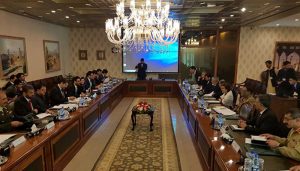Afghanistan Pakistan Action Plan for Peace and Solidarity
Afghanistan Pakistan Action Plan for Peace and Solidarity: In the 4th meeting of Afghanistan Pakistan Action Plan for Peace and solidarity held at the Ministry of Foreign Affairs, Islamabad and Kabul have agreed on effective and full implementation of APAPPS, vowing it will contribute towards the common objectives of eliminating terrorism and achieving peace, stability, prosperity and development of the people of the two countries.
Afghan Deputy Foreign Minister Hekmat Khalil Karzai lead the Afghan delegation while Ms. Tehmina Janjua stood at the top Pakistani front.

According to the joint statement issued by foreign office
“In pursuance of the seven principles agreed in the meeting between Afghan President Ashraf Ghani and Prime Minister Shahid Khaqan Abbasi during his visit to Kabul on 6 April 2018, the two sides finalized the Afghanistan Pakistan Action Plan for Peace and Solidarity (APAPPS). This operationalizes the six working groups envisaged under APAPPS”.
Objective of APAPPS
- APAPPS provides a framework to strengthen mutual trust and deepen interaction in all spheres of bilateral engagements. It is also a mechanism for finding solutions to bilateral areas of concern.

In the pursuance of the seven principals agreed in the meeting between Afghan President Ashraf Ghani and Prime Minister Shahid Khaqan Abbasi during his visit to Kabul on April 6, 2018, the two sides finalized APAPPS, which operationalizes the six working groups envisioned under the initiative. Ghani and Abbasi earlier reaffirmed their resolve to build trust and confidence between the two countries by working closely for peace, prosperity and stability in their countries. The two leaders agreed to continue the exchange of high level visits.
Both the countries committed to denying use of their respective territory by any country, network, group or individuals for anti-state activities against either country. They also decided to put in place a joint supervision, coordination and confirmation mechanism through Liaison Officers (LOs) for the realization of the agreed actions.
The two countries also committed to avoiding territorial and aerial violations of each other’s territory.
It is believed that the effective and full implementation of APAPPS would contribute towards the common objectives of eliminating terrorism and achieving peace, stability, prosperity and development of the people of the two countries.
For More Information & Videos Subscribe To Our YouTube Channel

